Saturday 21 March 1942
 |
| The German relief force attacking toward the Demyansk pocket, 21 March 1942. |
The Red Army fights desperately to open a supply corridor to the 130,000 troops now trapped on the west side of the Volkhov River due to the Germans' Operation Raubtier. The Soviets manage to open a small corridor for a short time, through which General Kirill A. Meretskov (undoubtedly under orders) personally enters the pocket to take command of the 2nd Shock Army. The Red Army troops in the pocket end their offensive toward Lyuban and Chudovo and prepare to defend the ground where they stand. The Soviets know better than to break out to the East without orders, as troops that did that during the Winter War were disciplined and sometimes executed. Stalin has not issued orders to retreat.
In Crimea, operations have ceased again as both sides have failed in recent attempts to end the stalemate on the Parpach Narrows. General Kozlov, commander of the Soviet forces, is building up his forces for a third attempt on the strong German base at Koi-Asan. General Manstein, meanwhile, is helped by a continuing Luftwaffe building as units return from the Reich after badly needed refits.
 |
| Germans using a captured Soviet T-60 light tank in defense of the Kholm pocket (Kampfgruppe Scherer) during spring 1942 (Muck, Richard, Federal Archive Figure 183-J19893). |
MacArthur quickly sets to work establishing his General Headquarters (GHQ) Southwest Pacific Area (SWPA). He staffs it with his fellow escapees from Corregidor, and they become known as the "Bataan Gang." This headquarters becomes known for its fanatical loyalty to MacArthur and its insularity. Lieutenant (junior grade) John D. Bulkeley, who led the PT boats that brought MacArthur out of the Philippines, goes on to a brilliant US Navy career and becomes MacArthur's biggest cheerleader, calling him "the greatest general as well as statesman since George Washington."
 |
| The Brooklyn Eagle, 21 March 1942. General MacArthur's escape receives worldwide attention. |
At Taungoo, Burma, about 60 Sikh sowars of the Burma Frontier Force make a desperate and futile cavalry charge against advancing Japanese infantry. This is the last British cavalry charge in history. The Japanese 112th Regiment is still assembling its forces for a major attack on the Oktwin position. The Chinese 200th Division today complete their defenses at Oktwin and Toungoo, helped by the time gained by the sacrificial cavalry charges. The Japanese, having finally overcome these delaying tactics, today close up on the 200th Division outposts at Oktwin and prepares for a set-piece attack. In a formality, the Chinese Expeditionary Force under Lt. General Joseph Stilwell and Chinese Lt. General Lin Wie officially becomes operational today.
Japanese aircraft raid the Magwe Airdrome at 14:30 and destroy nine RAF Blenheim Mk IV bombers and three American Volunteer Group P-40s on the ground, and three Hawker Hurricane Mk. II fighters in the air. Magwe now is the home base of the AVG "Flying Tigers." The defending AVG shoots down two "Nate" bombers.
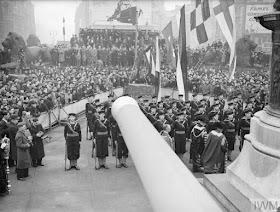 |
| "The Lord Mayor of London (back to camera) inspecting the Naval Guard of Honour at the opening ceremony." Warship Week Opening Ceremony in Trafalgar Square, 21 March 1942 (© IWM A 7981). |
Before invading Australia, the Japanese want to completely secure New Guinea. The RAAF today sends four Curtiss Kittyhawks Mk. IAs of RAAF No. 75 Squadron to help defend Port Moresby there. However, nervous antiaircraft gunners there mistake the planes for Japanese attackers and open fire. Three of the four planes are damaged, one irreparably, but manage to land at Seven Mile Aerodrome.
In the Philippines, the Allied forces on the Bataan Peninsula continue to hold out against the Japanese following MacArthur's escape. Lieutenant General Jonathan Wainwright, commander of U.S. Forces in the Philippines (USFIP), organizes his command on Corregidor Island. He appoints Major General Lewis Beebe his chief of staff. Major General Edward P. King, Jr., is named commander of Luzon Force. Today, General Yamashita sends a surrender demand to General Wainwright that is ignored. The US forces make a small raid on Mindanao to keep the Japanese busy.
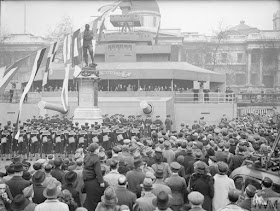 |
| The Warship Week opening ceremony in Trafalgar Square, 21 March 1942. Note that nobody seems particularly concerned about air attack. © IWM A 7980. |
Battle of the Atlantic: U-124 (Kptlt. Johann Mohr), on its eighth patrol out of Lorient, continues a very successful patrol off of the East coast of the United States by torpedoing two ships:
- 7934-ton US tanker Esso Nashville
- 11,355-ton US tanker Atlantic Sun
The weather in the Atlantic is rough today, causing 598-ton Panamanian Lumberboat Vamar to capsize off Port Saint Joseph, Florida, in 25 feet of water. The ship was carrying building materials for the Naval Base to be built at Guantanamo Bay. This wreck becomes a favorite spot for sport divers known as the "Lumberboat" or "Lumbership wreck." Previously named Eleanor Boling, the Vamar had served as Admiral Byrd's research vessel and supply ship during his quest to circumnavigate the South Pole in 1928. During this service, the ship brought the first mechanized vehicles (converted Model T Fords) to Antarctica.
German Kriegsmarine submarine commissionings continue to outpace the occasional losses. Today, U-442 (F.Kapt. Hans-Joachim Hesse) and U-517 (Kptlt. Paul Hartwig) are commissioned. The new boats have longer range and capabilities than most of the submarines the Reich began the war with. The new submarines are sent to training flotilla to work up.
In a continuing effort to distract the Germans from events at sea, the British Eighth Army launches more harassing attacks against Axis forces near Benghazi. This keeps the Axis reconnaissance aircraft occupied over the land rather than scouting out at sea where they might spot the numerous British ships. However, Italian submarines Onice and Platino both spot British convoy MW 10 and report its position. The Axis command in Rome orders Italian submarines Perla, Acciaio, and Galatea and German submarines U.73, U-205, and U-403 to the area. Commando Supremo also readies the Italian 4th Air Fleet and German II Air Corps for attacks. The Axis air forces get their first victim when 6 Italian Fiat CR-42 bombers sink British motor launch boat ML-129 between Gibraltar and Malta. There are seven deaths.
Axis air attacks on Malta continue today without let-up. The main German target, the RAF field at Ta Qali, suffers repeated attacks, as do the communities near it. Dozens of people are killed.
Battle of the Black Sea: German aircraft sink 2482-ton Soviet transport ship SS Georgi Dimitrov (Георгий Димитров) in Sevastopol Harbor. There are no casualties.
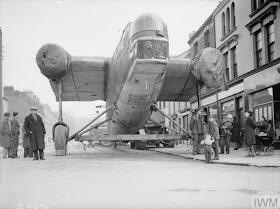 |
| "Bristol Bombay in a street in Hollywood, Northern Ireland, after a forced landing at Clandeboye." 21 March 1942 (© IWM HU 110308). |
Despite the loss of the Three Kings, the Czechs have real trouble brewing for the Germans. The British SOE has had agents embedded in the Prague vicinity since late December looking for an opportunity to assassinate Gauleiter Reinhard Heydrich. This is Operation Anthropoid.
US/Chinese Relations: The United States agrees to provide US$500 million in aid to China. This is a very strategic move as Chinese troops now are carrying most of the burden of fighting in Burma as the battered British forces there try to regroup.
 |
| The New Yorker, 21 March 1942. |
Japanese Military: In a curious incident, Rear Admiral Sosa Tanetsuga writes an article in the Japan Times warning of the vulnerability of the Japanese homeland to air attack from the Aleutian Island chain. The Aleutians have been watched closely by both sides for the same reason - their possible use for air attack - but why a Japanese officer chooses a newspaper to broadcast this is a mystery.
German Government: Fritz Sauckel, one of Hitler's old "street fighter" comrades, is appointed Reich Plenipotentiary General for Labor Mobilization. Sauckel's portfolio includes the power, in Hitler's name, to ship laborers from all across occupied Europe to Reich labor squads by any means necessary. This includes "shanghaiing" men off the streets. However, Sauckel cannot (under current practices) use the thousands of Jews now being deported from Eastern Galicia to the new death camp at Belzec (this will change in the near future). Sauckel, whose appointment is a sign of German recognition that the war in the Soviet Union is going to be harder and longer than anticipated, will receive the death penalty at Nuremberg for his treatment of laborers.
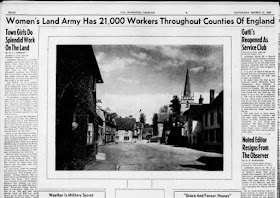 |
| The Winnipeg Tribune reports in its 21 March 1942 edition that the "Women's Land Army Has 21,000 Workers Throughout The Counties of England." |
Future History: Ali Abdullah Saleh is born in Al-Ahmar, Yemen He will serve as the 1st President of Yemen from 22 May 1990 to 25 February 2012. Notable for developing deeper ties with Western powers, particularly in the war on terror, Saleh passes away on 4 December 2017.
Françoise Dorléac is born in Paris, France. The sister of famous actress Catherine Deneuve, Françoise also becomes an actress primarily in Europe. Françoise Dorléac dies tragically on the cusp of stardom on 26 June 1967 in a car accident.
 |
| The Australian Women's Weekly, 21 March 1942. |
March 1942
March 1, 1942: Second Battle of Java Sea
March 2, 1942: Huge Allied Shipping Losses at Java
March 3, 1942: Japan Raids Western Australia
March 4, 1942: Second Raid On Hawaii
March 5, 1942: Japan Takes Batavia
March 6, 1942: Churchill Assaults Free Speech
March 7, 1942: British Defeat in Burma
March 8, 1942: Rangoon Falls to Japan
March 9, 1942: Japanese Conquest of Dutch East Indies
March 10, 1942:US Navy attacks Japanese Landings at Lae
March 11, 1942: Warren Buffett's First Stock Trade
March 12, 1942: Japan Takes Java
March 13, 1942: Soviets Attack In Crimea Again
March 14, 1942: The US Leans Toward Europe
March 15, 1942: Operation Raubtier Begins
March 16, 1942: General MacArthur Gets His Ride
March 17, 1942: MacArthur Arrives in Australia
March 18, 1942: Japan Attacks In Burma
March 19, 1942: Soviets Encircled on the Volkhov
March 20, 1942: "I Shall Return," Says MacArthur
March 21, 1942: Germans Attack Toward Demyansk
March 22, 1942: Second Battle of Sirte
March 23, 1942: Hitler's Insecurity Builds
March 24, 1942: Bataan Bombarded
March 25, 1942: Chinese Under Pressure in Burma
March 26, 1942: Win Or Die, Vows MacArthur
March 27, 1942: The Battle of Suusari
March 28, 1942: The St. Nazaire Commando Raid
March 29, 1942: The Free Republic of Nias
March 30, 1942: Japanese-Americans Off Bainbridge Island
March 31, 1942: Japanese Seize Christmas Island
2020
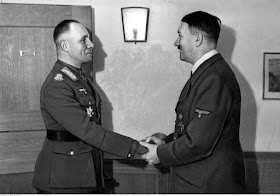
No comments:
Post a Comment